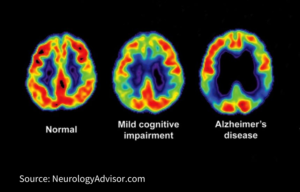What is Mild Cognitive Impairment (MCI)?
 Some people with memory problems have a condition called mild cognitive impairment, or MCI. MCI has several types. The type most associated with memory loss is called amnestic MCI.
Some people with memory problems have a condition called mild cognitive impairment, or MCI. MCI has several types. The type most associated with memory loss is called amnestic MCI.
Researchers have found that more people with MCI than those without it go on to develop Alzheimer’s. However, not everyone who has MCI develops Alzheimer’s disease. About 8 of every 10 people who fit the definition of amnestic MCI go on to develop Alzheimer’s disease within 7 years. In contrast, 1% to 3% of people older than 65 who have normal cognition will develop Alzheimer’s in any one year.
What Are the Symptoms of MCI?
People with amnestic MCI have more memory problems than normal for people their age, but their symptoms are not as severe as those of people with Alzheimer’s disease. For example, they do not experience the personality changes or other problems that are characteristic of Alzheimer’s. People with MCI are still able to carry out their normal daily activities.
Signs of MCI include:
- Losing things often
- Forgetting to go to events or appointments
- Having more trouble coming up with words than other people of the same age
- Movement difficulties and problems with the sense of smell
How Is MCI Diagnosed?
Family and friends may notice memory lapses, and the person with MCI may worry about losing his or her memory. These worries may prompt the person to see a doctor for diagnosis.
Research suggests genetic factors may play a role in who will develop MCI, as they do in Alzheimer’s. Studies are underway to learn why some people with MCI progress to Alzheimer’s and others do not.
RELATED | Learn more about Alzheimer’s & related dementias
A doctor can do thinking, memory, and language tests to see if a person has MCI. He or she also may suggest that the person see a specialist for more tests. There currently is no standard treatment for MCI, but there are things a person can do that may help them stay healthy and deal with changes in their thinking.
Because MCI may be an early sign of Alzheimer’s disease or another kind of dementia, it’s important to see a doctor or specialist every 6 to 12 months.
Source: National Institute on Aging
